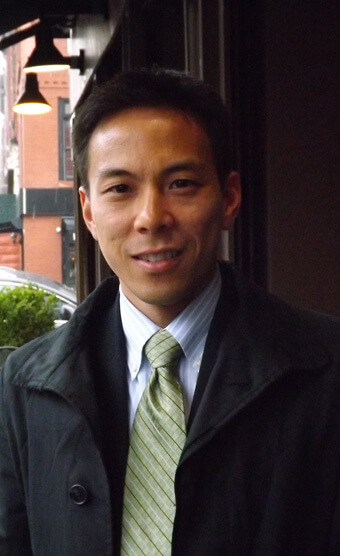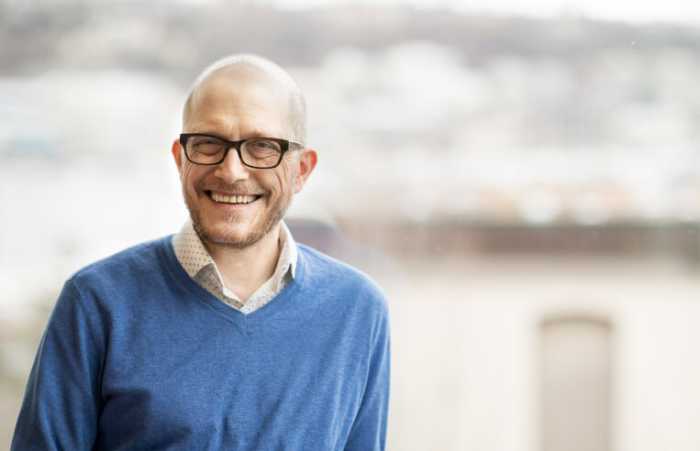Kelsey Louie, who will take the reins at Gay Men’s Health Crisis in June. | GAY CITY NEWS
At Harlem United, Kelsey Louie is the boss in every way except his title. He was made the chief operating officer last year, and every function at the AIDS services agency reports to him, but he reports to Steven Bussey, the chief executive officer. With a background in management consulting and on Wall Street, Bussey chaired the agency’s board from 2007 until 2010. He was made CEO when Patrick McGovern, the longtime head, left in 2010.
Louie –– named this week to the top post at Gay Men’s Health Crisis –– runs Harlem United’s 585 housing units, its two clinics with attached adult day care centers, all client services, and all administration, overseeing 350 people and an annual budget of $42 million. According to Harlem United’s 2011 Form 990, the most recent year that Gay City News could find, Louie was then earning just under $200,000. He declined to say what GMHC will be paying him.
About five or six weeks ago, GMHC approached him to run the agency with nearly 160 employees and an annual budget of $27 million. The group’s longtime executive director, Dr. Marjorie Hill, left late last summer. Louie, who will take over at GMHC on June 16, went through a series of interviews and when he told Harlem United he was leaving, that agency countered by offering him the CEO title. He chose to move to a smaller agency that has had a rash of bad press, with reports of internal problems.
Aware of problems besetting world’s oldest AIDS agency, 39-year-old gay men steps up as state moves to “end” epidemic
“I want to build on GMHC’s rich history,” said Louie, a 39-year-old gay man. “I would like to be a part of GMHC’s sustainability and success.”
GMHC saw its revenues decline from 2007 through 2011. The agency made a controversial move to its West 33rd Street headquarters in 2011 and is paying a high rent on a large space that it is not using entirely. GMHC increasingly relies on state, local, and federal government funding that is now being cut.
When Christine Quinn was the City Council speaker, she handed out millions in discretionary funds to favored agencies, GMHC among them. The Council, now under Melissa Mark-Viverito, will have new rules that are meant to more equitably divide discretionary funds among the 51 Council members.
“I’m fully aware of the challenges in front of me and I need to take action immediately,” said the Brooklyn native. “I think it’s important that GMHC succeed.”
Other AIDS groups, such as Harlem United and Housing Works, long ago diversified their funding streams, both public and private, so their cash is a mix of Medicaid dollars, housing contracts that Louie said are “large and stable,” and private resources, such as Housing Works’ thrift shops.
GMHC has two major fundraisers a year, its government contracts, and private fundraising that has become much tougher as the LGBT community in particular has opted to support other causes, such as marriage equality, and as HIV has moved out of the spotlight though not out of the lives of gay men and transgender people.
GMHC has also faced questions about its relevance as people with HIV are living long lives and not going on disability. While some people with HIV are disabled by the virus and do need help, skeptics are asking if an AIDS agency should be delivering services like hot meals and art classes to clients or helping them get jobs, as Housing Works does.
“I’m aware of all the things that have been said about GMHC,” Louie said. “I feel like I’m the best person to lead GMHC into its future.”
On top of all of this, Housing Works and ACRIA have taken the lead in promoting a plan to end AIDS that requires a shift in how agencies do their work. The plan aims to reduce new HIV infections to a few hundred a year in New York State, as opposed to roughly 3,400 currently, by 2020. GMHC has endorsed the plan, as have many other AIDS groups.
This plan will mean that AIDS groups have to focus more on identifying HIV-positive people and getting them on treatment –– and ensuring their adherence to it –– so they are less infectious. Groups will also have to promote pre-exposure prophylaxis (PrEP), the use of anti-HIV drugs by HIV-negative people to prevent them from becoming infected, and post-exposure prophylaxis (PEP), the use of anti-HIV drugs in the immediate aftermath of exposure to the virus to prevent infection from taking hold.
This plan will certainly mean changes in what government funders will pay for. PEP and PrEP remain little known among people who are at risk for HIV infection.
“I don’t know that AIDS service providers have done a great job as a whole,” Louie said referring to educating people about PEP and PrEP.
GMHC is applying for state licenses that will allow it to provide the mental health and drug treatment services that are very much a part of helping HIV-positive people stay on their HIV medications and could contribute to helping gay men on PrEP adhere to that drug regimen, which is critical to its effectiveness.
Louie said that GMHC offers a vital place to begin.
“I don’t necessarily see it as a step down,” he said, referring to his move from Harlem United. “GMHC being the first and oldest AIDS organization offers a larger platform.”




































